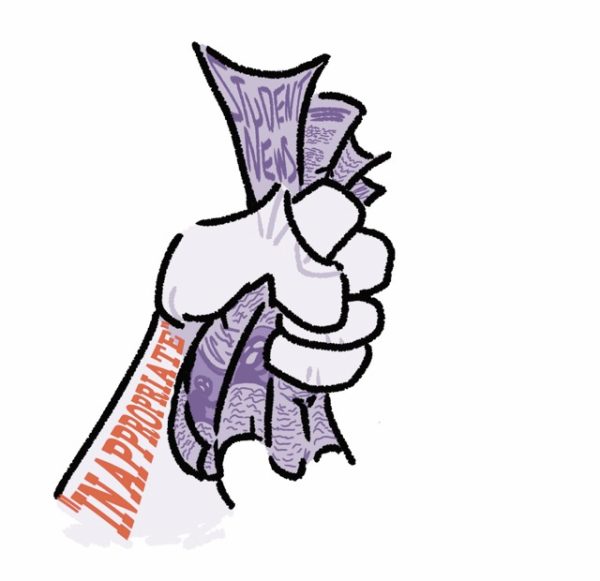
Student journalists are finding it more difficult to write articles freely without the problem of censorship across the country.
Censorship is an issue that has been affecting students for a long time, and in many ways. According to the Student Press Law Center, censorship is “anytime someone who works for the school prevents or attempts to prevent you from publishing content in your student publication.” One of the biggest issues for students is censorship in journalism, which is violating their rights and abilities to share information with the school and express themselves through their writing.
“Censorship also infringes on students’ First Amendment rights,” executive director of the Nebraska High School Press Association Michelle Hassler said. “Student journalists should be able to freely express themselves through ethical reporting that is responsible, not libelous nor an invasion of privacy.”
One example of censorship happened locally in North Platte. An article written by former graduate Sophia Walsh, who at the time was Editor-in-Chief for North Platte High School’s newspaper, The Bulldogger, was censored for her article discussing students stealing Confederate flags. Her article later went on to go deeper into experiences of racism at her school and other administrative issues, which is when the school took a closer look at what she was writing on and ultimately censored her.
“Once we started talking more about administrative problems and more issues that were popping up,
the more unsure they were about the story…I think it just shined a poor light on the school and they didn’t want that published,” Walsh said.
Censorship is not something to be taken lightly when it happens, and students are left trying to find ways around it when it does. If they do not, they have to get rid of the article altogether or revise it in ways they didn’t originally intend. Walsh, for example, took her article to another publication company who was willing to let her report on the issue and got it published outside of her school.
“I think it’s definitely a good course of action; it’s one that I think students should look into before doing it…presenting that story to a different publication I think is a good way to go,” Walsh said.
Another local case of censorship happened at Grand Island Northwest High School. Former student Marcus Pennell and others wrote about LGBTQ issues in the June edition of their newspaper, the Viking Saga. Shortly after the publication of that issue, the newspaper was shut down by the administration without warning.
“I thought it was my fault because of this article I wrote, and there were a couple other articles about LGBTQ issues in there…we felt really guilty about it,” Pennell said.
In Pennell’s case, he was not planning on taking a standstill. He and others took the case all the way to court, saying their First Amendment rights were violated by shutting down the newspaper after their articles were written. At the end of the legal battle, neither Pennell nor the state won.
“The ACLU kind of got involved and we filed a case against my school, saying that they violated
my First Amendment rights, and then that case got dismissed,” Pennel said.
Pennel’s case isn’t the only issue in the courtroom regarding censorship at the moment. A new legislative bill, titled LB 1071, is supporting student journalists and intends to give them more rights. However, the OPS school board has not endorsed this bill yet, which was originally planned to be lobbied but is now being “monitored with research.”
“It’s so frustrating when in the state of Nebraska it depends on what school district you go to, it depends on who your administrator
Illustration by Lisa Connell
it is on what you get to write about or what gets published… it’s interesting to me that school districts get so scared that there’s going to be a dissenting opinion differing opinion than what the school agreed with,” President of the Nebraska High School Press Association Erica Brockmoller said.
Censorship is often such a big issue in high schools because student journalists are not part of an independent newspaper organization. Because they are through the school, many schools practice prior review and people have to approve their newspaper,
which has many opportunities for censorship. Some students still feel the effects of censorship today, years later.
“I was really scared in college of the same thing happening, or of facing the same kind of harassments I did, so I had to learn to work through that fear, and to keep writing, and to keep writing about the things that I care about… and deserve to be written about,” Pennell said.
Students are rarely censored for the reason being their writing is actually unethical. Many administrations have the power to quickly shut down any article they disagree with or dislike and label it as “inappropriate.” If students are reporting correctly and telling the public their information, there is little value in censorship.
“If a journalist is doing everything that they’re supposed to be doing, reporting on both sides of the story, making sure that their sources are accurate and double checking everything, I don’t know why a school would need to censor a student,” Brockmoller said.
Through censorship, student journalists are limited as to what they can write on and what they are passionate about. Lately, censorship has been happening more and more, and students are not allowed to cover what they want to. It is a big issue in our society today and among students.
“I think it is a big issue because it unfortunately is occurring more often, but it is in direct conflict with the teaching of journalism,” Hassler said. “Censorship is wrong, demoralizing and sends a troubling message to students. Censorship directly affects students’ abilities to practice real-life journalism, which is important for their learning.”


